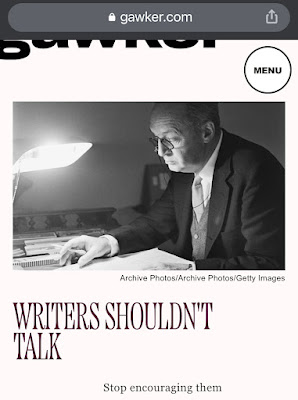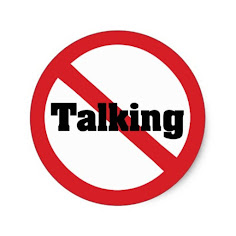Previously, we posted that Vladimir Nabokov shared in the foreword to Strong Opinions: "I think like a genius, I write like a distinguished author, and I speak like a child." Thus, Nabokov considered himself a good writer but a poor speaker. So much so, that his lectures and interviews were pre-written. Nabokov related:
"Throughout my academic ascent in America from lean lecturer to Full Professor, I have never delivered to my audience one scrap of information not prepared in typescript beforehand and not held under my eyes on the bright-lit lectern.""The interviewer's questions have to be sent to me in writing, answered by me in writing, and reproduced verbatim. Such are the three absolute conditions."
And Becca Rothfeld posted on Gawker that "WRITERS SHOULDN'T TALK: Stop encouraging them", because writers are "isolated" "amenders" whom delete "[...] unsatisfactory variants of a single sentence for upwards of an hour".
For one thing, authors are often poor orators, inept at the most basic mechanics of verbalization. They hum and halt and hesitate, interrupting themselves, appending caveats to their caveats, thrumming a chorus of tentative “ums.” They are drafters and amenders, if not by vocation than by profession, and in conversation, their strongest pronouncements tend to be timid, as if they were editing in real time.Who in their right mind would want to talk, much less listen, to a person who has contrived to spend as much of her life as possible crouched over her computer in isolation, deleting unsatisfactory variants of a single sentence for upwards of an hour?
Therefore, how can writers be expected to speak well when they're used to carefully crafting their sentences? Although, there are some exceptions (e.g., Rothfeld posted a link to an exceptional conversation that David Foster Wallace had with Charli Rose), in the end, it may be best to follow Rothfeld's advice:
Most writers are not talkers for a reason. Stop encouraging them to humiliate themselves in conversation so that they can return to the impossibly difficult business of perfecting themselves in print.

